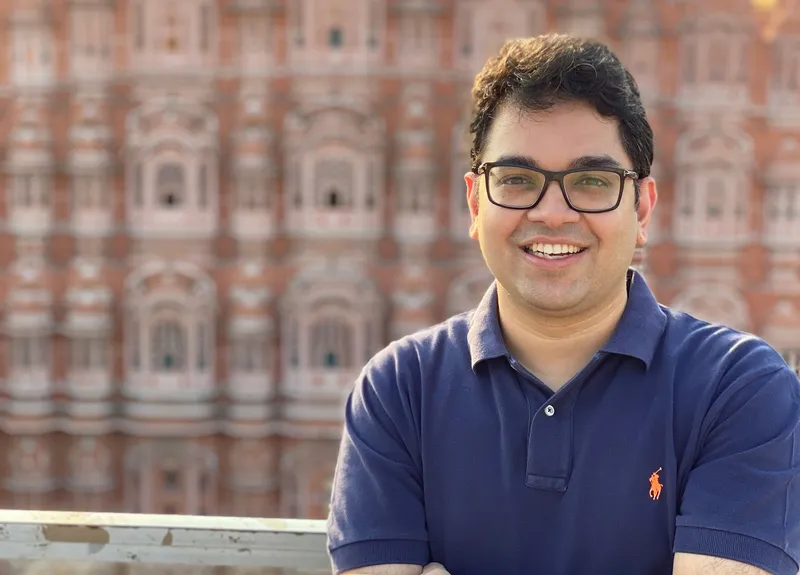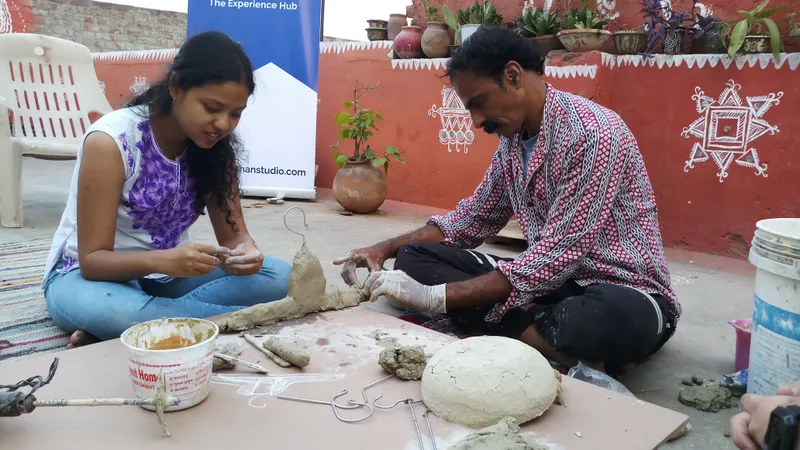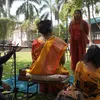With over 250 artists, this startup is providing an experiential art platform to art lovers from around the world
Rajasthan Studio is a startup focused on offering personalised, hands-on art experiences specially curated by master artists of Rajasthan at their workstations.
From Chamba paintings to handloom weaving, India has witnessed a slew of art forms over the decades, thanks to its cultural diversity. But somewhere along the line, many of these art forms lay forgotten, with very few takers and even fewer artists following the path.
Kartik Gaggar, 30, a chartered accountant by profession, was on the lookout for organisations that offered experiential travel related to the art scene in India.

Kartik Gaggar
Dealing with numbers and all things finance, Karthik was keen on investing in the tourism and art space, but did not find anything suitable. He did the next best thing and went on to materialise his idea into a startup, calling it Rajasthan Studio. He launched it in 2018, as a one-stop place for tourists who wanted to experience Indian art forms.
“After extensive research and documentation for two years, I mapped out a concrete plan, shortlisted art forms and selected about 15-20 master artisans, and founded Rajasthan Studio with a vision to not only bring in travellers, art enthusiasts and artists together, but to also conserve the dying art forms of the country,” Kartik tells SocialStory.
“I wanted to give people a slice of local life in India, and build a global community of artists that thrive on mutual learning and valuable connections,” he adds.
Connecting art lovers
Rajasthan Studio is a startup focused on offering personalised, hands-on art experiences, specially curated by master artists of Rajasthan at their workstations, to give travellers and art lovers an authentic and unforgettable art-making experience.
Apart from this, it has another vertical, a non-profit, free-for-all artists platform called ‘The Circle’, which before the pandemic was a physical community of around 100 artists from Rajasthan.

The coronavirus pandemic led the team to adapt and take their operations online, and it has now grown to over 2500 artists from around the world. Its principal focus is to give artists a free-flowing platform for learning, networking, and leisure.
“Through Instagram Live, we made sure to connect our followers with the ones who are making an impact in their fields. The overwhelming response that our live sessions got led us to recently complete 365 consecutive Insta Live sessions. We also introduced curated virtual art experiences for corporates, art lovers, and individuals,” says Kartik.
Some of the classes include ‘papier mâché’ sculpting, Jaipur blue pottery, art engraving, wooden block making, and meenakari (a kind of art form on silver) among many other vibrant art forms.

Papier Mâché art class
Each of these classes are priced between Rs 1200 to about Rs 6000. “We charge 20 percent service fees from the artists, i.e., we give 80 percent of the total earnings of the art workshops to the artists, and keep the remaining commission,” says Kartik.
Another online initiative of Rajasthan Studio, Aathun, was fuelled by the desperate need of the hour to help the folk artists who had lost their primary income due to the worldwide travel ban and lockdown. Rajasthan Studio helped organise live performances on its YouTube channel on pay-as-you-like models directly to artists via online payment channels.
Aathun also got recognised in the Outlook Traveller Responsible Tourism Awards, and bagged a Silver in the category ‘Best Alternative Livelihood Tourism.’
“We continue to work on Aathun and have added various segments to it focused on preserving and promoting the folk culture of the country,” says Kartik.
Impact
With its virtual platform, Rajasthan Studio has been offering online art experiences worldwide. More than 250 artists from various places in the country have been onboarded, and now regularly conduct paid art workshops. The art workshops offered by the studio is anywhere between two to four hours long.
Through its initiatives, Rajasthan Studio has also connected with and impacted over 2500 artists from around the country and over 20,000 attendees worldwide.
In post-pandemic times, when tourism fully opens up, it aims to curate art experiences in other states too.

Meenakari work being done on silver in one of the classes.
The startup is completely bootstrapped as of now. Although he only just incidentally became a social entrepreneur, Kartik is working on a long term plan.
“With Rajasthan Studio, I had a 10-year vision, but the pandemic has impacted it greatly because it has just taken away two good years to make it a model that is investment-pitch ready,” he says.
“That said, there are no regrets because the pandemic also helped us tap into new opportunities, opening up many other doors for us. In June, we held a one-of-its-kind virtual art experience festival, and since July 2020, the growth in terms of the number of artists, the reach, and all other KPIs have been 2x on a month-on-month basis,” says the proud founder.
Until July 2020, the studio conducted 10 virtual art workshops per month, and now, it is looking at doing 10 plus workshops a day, which according to Kartik makes the future promising.
Challenges and the way forward
As in the case of every company while starting up, Rajasthan Studio was not short of challenges.
“Because we are selling a very niche product and service, the biggest challenge was reaching out to people and convincing them to try it because without knowing what we are offering, they will not understand the importance of it. We are delivering passion, and the combination of learning, networking, and leisure through art is just beyond something that can be explained through words. It needs to be experienced,” shares Kartik.
Rajasthan Studio aims to connect with over 500 artists from other states, and onboard around 50 experts out of the lot.
“We have quite a comprehensive plan ready. We want to scale our circle community. As and when travel opens up, we want to add on art experiences in other states, build a strong tech side for the business, and of course, raise funds to amplify growth,” Kartik signs off.
Edited by Anju Narayanan









